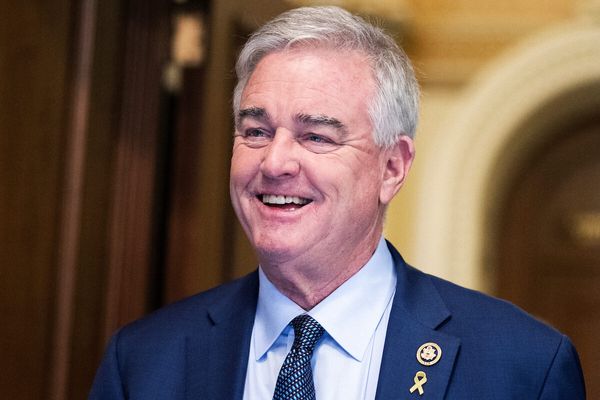
Steve Scalise, the Louisiana Republican whom some in his party reportedly want to elect as speaker of the US House of Representatives after the stunning and historic removal of Kevin McCarthy, was once reported to have called himself “David Duke without the baggage”.
Duke, 73, is a former Grand Wizard of the Knights of the Ku Klux Klan, an avowed white supremacist who ran for Louisiana governor, the US House and Senate, and for president, and who in 2003 was sentenced to 15 months in jail for mail and tax fraud.
Scalise, now 57, was elected to Congress in 2008. He became Republican House whip in 2014 and was elected majority leader in 2022, as a hardline conservative acceptable to the far right of his party, which has now successfully rebelled against McCarthy.
Ahead of McCarthy’s removal, Scalise implored his fellow Republicans “to keep doing this work that we were sent to do” rather than focus on ejecting the speaker.
“This isn’t the time to slow that process down,” said Scalise, denying interest in the speakership.
Immediately after the vote to remove McCarthy, however, the ringleader of the motion to vacate, Matt Gaetz of Florida, used his first remarks to say Scalise would be “a phenomenal speaker”.
Gaetz also said Tom Emmer of Minnesota, Mike Johnson of Louisiana, Jody Arrington of Texas and Kevin Hearn of Oklahoma might be good choices.
But the speakership may offer Scalise a tempting prize: if he is elevated into the role, he will become the highest-ranking member of Congress ever to come from Louisiana.
Politico’s Olivia Beavers reported later Tuesday that Scalise had started to “reach out to [House] members” ahead of launching a bid for the speakership. CNN’s Melanie Zanona added that “a number of Republicans have already pledged their support”.
“He’s getting good support already,” Zanona quoted one Republican House member whom she didn’t name as saying.
Duke, Scalise’s fellow Louisianan, last made national headlines when he supported Donald Trump for president in 2016 – support Trump was slow to disavow.
Two years before that, Scalise ran into controversy, and his remark about Duke surfaced, after a blogger revealed Scalise’s attendance at a white supremacist conference organised by Duke in 2002.
Scalise, whose district includes a large suburban area of New Orleans that Duke once represented in Louisiana’s state legislature, said he had been seeking “support for legislation that focused on cutting wasteful state spending, eliminating government corruption and stopping tax hikes”, but “wholeheartedly condemn[ed]” the views of the group concerned.
He also said attending the conference “was a mistake I regret”, as he “emphatically oppose[d] the divisive racial and religious views that groups like these hold”.
Citing his Catholicism, Scalise said “these groups hold views that are vehemently opposed to my own personal faith, and I reject that kind of hateful bigotry. Those who know me best know I have always been passionate about helping, serving and fighting for every family that I represent. And I will continue to do so.”
Duke, however, told the Washington Post: “Scalise would communicate a lot with my campaign manager, Kenny Knight. That is why he was invited and why he would come. Kenny knew Scalise, Scalise knew Kenny. They were friendly.”
That wasn’t the end of it. The controversy deepened when Stephanie Grace, a Louisiana politics reporter and columnist, told the New York Times that at the start of Scalise’s legislative career, while “explaining his politics”, he told her “he was like David Duke without the baggage”.
Grace said she thought Scalise had “meant he supported the same policy ideas as David Duke, but he wasn’t David Duke, that he didn’t have the same feelings about certain people as David Duke did”.
Scalise did not comment on Grace’s remarks. But Chuck Kleckley, the Republican speaker of the Louisiana state house at the time, told the paper comparisons between Scalise and the Klan leader were “not fair to Steve at all”.
Nonetheless, the Duke controversy has followed Scalise throughout a career in Republican leadership, which has seen him survive being seriously wounded in a mass shooting at congressional baseball practice, in 2017; become one of five Louisiana Congress members to vote against certifying some election results hours after the deadly Capitol attack of 6 January 2021; become majority leader in 2022; and, in August this year, announce a cancer diagnosis.
The 2017 shooting was an assassination attempt. The gunman, a leftist extremist who was killed by law enforcement, legally bought the rifle used to shoot Scalise and three others despite a history of run-ins with police.
Despite that, through legislation he has sponsored and co-sponsored, Scalise has staunchly advocated to keep guns as accessible to the public as possible, citing the right to bear arms enshrined in the US constitution’s second amendment.
In the aftermath of his own shooting, Scalise told reporters: “I was a strong supporter of the second amendment before the shooting and, frankly, as ardent as ever after the shooting in part because I was saved by people who had guns.”
Last month, discussing his recent diagnosis of multiple myeloma, Scalise said aggressive treatment meant his outlook was improving.
Should Scalise eventually secure the speaker’s gavel, he will surpass the New Orleans Democrat Hale Boggs as the most powerful member of Congress ever to come from their state. Boggs was House majority leader before his plane disappeared over Alaska in 1972.
This article was amended on 3 October 2023 to correct who Matt Gaetz said might be good choices for House Speaker.







